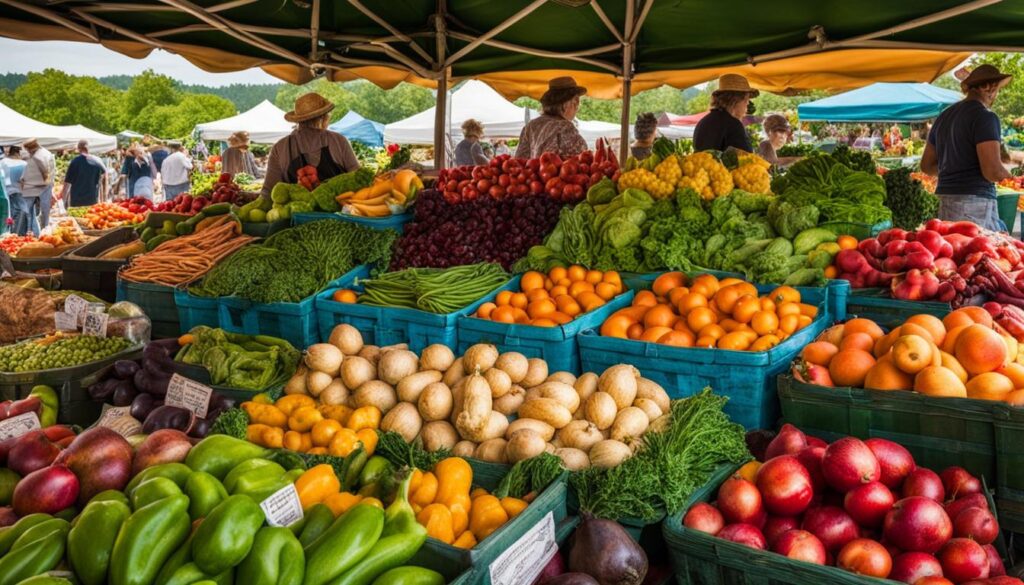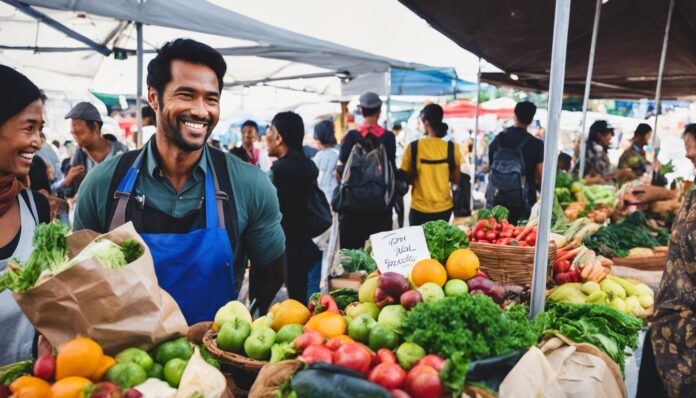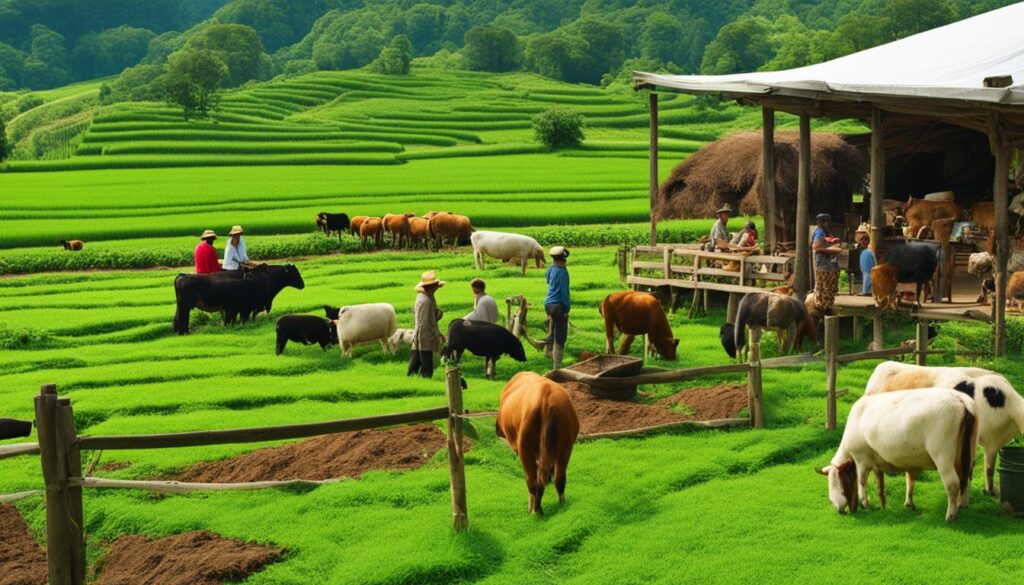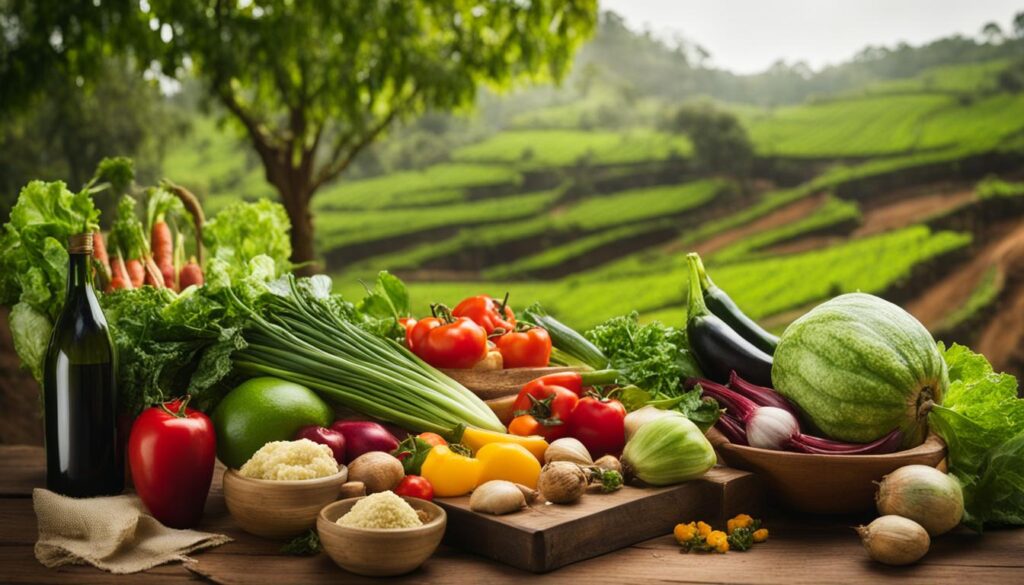If you’re someone who loves to experience different cultures through local cuisine, then food tourism is likely on your travel itinerary. However, have you ever stopped to consider the impact that your food choices can have on the environment and the local communities you visit? Sustainable and ethical food tourism should be a priority for conscious travelers like you. By making responsible choices, you can ensure that your food experiences not only positively impact the destination but also leave a lasting impression on your taste buds and memories. This section is an introduction to sustainable and ethical food tourism, delving into the importance of responsible food tourism and the ethical considerations to keep in mind.
What are some sustainable and ethical considerations for food tourism? From farm-to-table practices to supporting local food cultures and reducing food waste, there are many ways to participate in responsible food tourism. This section will explore some of the most vital considerations when it comes to sustainability and ethics in food tourism, so you can make informed choices during your travels.
Understanding Sustainable Food Practices
When it comes to sustainable food practices in food tourism, it is crucial to be mindful of the impact that food production and consumption can have on the environment. Sustainable agriculture in tourism allows individuals and businesses to support eco-friendly practices that promote biodiversity, reduce pollution, and preserve natural resources.
Organic farming methods are one of the primary ways that sustainable food practices are implemented in food tourism. This method avoids the use of synthetic pesticides and fertilizers, which can be harmful to both the natural ecosystem and human health. By supporting organic farming, you can ensure that the food you consume during your travels is produced in an environmentally friendly way.
Local sourcing is another key element of sustainable food practices in tourism. By choosing to eat at restaurants that source their ingredients from local farms and suppliers, you can help support the local economy and reduce the carbon footprint of food transportation. Not only that, but locally sourced ingredients often taste better and are more nutritious!
To further minimize the environmental impact of food tourism, reducing food waste is essential. This can be accomplished by choosing dining establishments that prioritize reducing food waste, or by taking simple steps like ordering only what you know you can eat. By doing so, you can help reduce the amount of food that goes uneaten and ultimately ends up in landfills.
In summary, sustainable food practices in food tourism encompass a range of eco-friendly choices, from organic farming methods to reducing food waste. By being mindful of these practices and making sustainable choices during your travels, you can help support a more responsible and ethical food tourism industry.
Embracing Ethical Considerations
When it comes to food tourism, ethical considerations are crucial. By embracing fair trade practices, supporting local economies, and ensuring humane animal treatment, you can make a positive impact on the world around you.
Ethical Food Sourcing
If you’re looking to introduce ethical practices into your food tourism experiences, sourcing food ethically is a great place to start. Choosing local, organic produce is one way to support sustainable agriculture and promote local economies.
When you source your food, consider visiting local farmers markets or researching local suppliers on the web. By choosing to source locally and sustainably, you can nurture a more responsible and sustainable food tourism industry.
Fair Trade in Food Tourism
In addition to ethical food sourcing, supporting fair trade practices is another crucial consideration in food tourism. By ensuring that the food products you consume are produced ethically and workers are treated fairly, you can make a positive impact on the world.
| Benefits of Fair Trade in Food Tourism | What You Can Do |
|---|---|
| Better living conditions and wages for workers | Support fair trade organizations and businesses |
| Encourages sustainable agricultural practices | Ask about fair trade practices when dining out or purchasing food products |
| Promotes community development and empowerment | Spread awareness about fair trade practices amongst your friends and family |
Humane Animal Treatment
Many consumers are increasingly concerned with how animals are treated in the food industry. When planning your food tourism experiences, consider looking for restaurants that source meat and dairy products from humanely treated animals.
If you’re looking to experience animal welfare in food tourism, consider visiting animal sanctuaries that specialize in ethical and sustainable farming practices, such as California’s Animal Place. By engaging in food tourism that supports humane animal treatment, you can make a difference and promote a more compassionate and sustainable food tourism industry.
Promoting Eco-friendly Food Tourism
As a responsible food tourist, one of the fundamental ways to minimize your ecological footprint is to adopt eco-friendly food tourism practices. By taking conscious choices, you can ensure that your gastronomic adventures are sustainable and do not harm the environment. Here are some ways you can promote eco-friendly food tourism:
Opt for plant-based or sustainable seafood options
Eating less meat and seafood, especially those from unsustainable sources, can significantly reduce your carbon footprint. Vegetarian and vegan options are plentiful and often innovative, allowing you to experience unique and exciting flavors while supporting sustainable food practices. Opting for sustainably sourced seafood is another way to reduce your ecological impact and promote ethical fishing practices.
Minimize food packaging waste
The food packaging industry is a significant contributor to plastic waste, affecting ecosystems worldwide. When dining out, choose restaurants that use sustainable practices and packaging materials, such as reusable or compostable containers. Choosing unpackaged or minimally packaged food items, such as fruits and vegetables, can also help reduce waste.
Choose eco-friendly dining establishments
You can contribute to sustainability by supporting restaurants that focus on eco-friendliness. ‘Farm-to-table’ restaurants, where menus feature sustainably produced fresh ingredients, can be a great choice. These establishments typically support local agriculture, reducing your food’s carbon emissions and promoting local economic development.
Incorporating these eco-friendly food tourism practices into your gastronomic adventures is not just about preserving the planet. It’s also about preserving food cultures and supporting local communities by making conscious choices and increasing awareness of sustainability.
Nurturing Sustainable Gastronomy
In food tourism, sustainable gastronomy involves more than just responsible food practices. It also encompasses cultural preservation and community engagement. By embracing sustainable gastronomy, you can support local communities, protect cultural practices, and promote environmentally conscious food choices.
One way to nurture sustainable gastronomy is by seeking out authentic culinary experiences that showcase local flavors and traditions. Try local specialties made with locally sourced ingredients, and support small-scale food producers.
Did You Know? Sustainable gastronomy also involves minimizing food waste and reducing greenhouse gas emissions from food production and transportation.

Another way to support sustainable gastronomy is by participating in culinary events and festivals that celebrate local cuisines. These events provide an opportunity to learn about local food traditions and connect with the community.
Tips: When planning your food travel itinerary, make sure to research restaurants and food establishments that prioritize sustainable and ethical practices. Look for certifications such as Fair Trade, Rainforest Alliance, and USDA Organic.
By nurturing sustainable gastronomy, you can contribute to a more responsible and impactful food travel experience. You can also support local communities and cultures while enjoying delicious, authentic food.
Supporting Local and Indigenous Food Cultures
Preserving and celebrating local and indigenous food cultures is an essential aspect of responsible food tourism. By seeking out traditional dishes and culinary experiences, you can support the cultural heritage of a destination and contribute to the local economy.
When traveling to a new destination, make an effort to learn about the local food culture and try traditional dishes. This not only supports local businesses but also fosters a deeper understanding and appreciation of the community’s history and customs.
“Food is our common ground, a universal experience.” – James Beard
Not only is local and indigenous food culture important for cultural preservation, but it also promotes sustainable food practices. Local ingredients are typically fresher and require less transportation, reducing carbon emissions. Supporting small-scale farmers and indigenous communities also ensures that traditional farming methods are preserved, which often involve environmentally-friendly and sustainable practices.
| Destination | Traditional Dish | Local Ingredient |
|---|---|---|
| New Orleans | Jambalaya | Crawfish |
| Peru | Ceviche | Fresh seafood |
| Hawaii | Poke | Ahi tuna |
Table: Examples of Traditional Dishes and Local Ingredients
By seeking out traditional dishes and culinary experiences that support local and indigenous food cultures, you can contribute to a more sustainable, responsible, and authentic food tourism experience.
Reducing Food Miles and Carbon Footprint
When it comes to ethical and sustainable food tourism, reducing food miles and carbon footprint should be a top priority. Food miles refer to the distance that food travels before it reaches your plate. By reducing food miles, you can minimize the carbon emissions generated during transportation.
One effective way to reduce food miles is to opt for locally sourced ingredients. This means supporting local farmers and choosing seasonal produce that is grown in your area. By doing so, you not only reduce carbon emissions but also support the local economy.
Farm-to-table dining is another great way to reduce food miles. This concept involves sourcing ingredients directly from local farmers and serving them fresh and unprocessed to consumers. Many restaurants have started incorporating farm-to-table dining into their menus, providing customers with a unique and sustainable culinary experience.
Not only does reducing food miles and carbon footprint help the environment, but it also benefits the local community. By supporting local farmers, you promote sustainable agriculture and boost the economy of the surrounding area. Additionally, choosing seasonal ingredients means you are consuming food that is fresh and harvested at its peak.
As a responsible food tourist, it’s essential to consider the impact of your food choices. Minimizing food miles and carbon footprint is just one way you can contribute to a more sustainable future.
Engaging in Responsible Food Souvenirs
Food souvenirs are an integral part of food tourism, but it’s essential to make responsible choices to minimize environmental harm and protect local cultures. Here are some tips to engage in responsible food souvenirs:
- Support local food artisans who use sustainable practices and techniques to create their products.
- Choose food souvenirs that do not contribute to environmental harm, such as those that are packaged with sustainable materials.
- Avoid buying food souvenirs that may contribute to cultural appropriation, such as products that have been falsely marketed as local cuisine.
By making these choices, you can participate in a sustainable and ethical food tourism experience that supports local cultures and communities. Furthermore, choosing responsible food souvenirs can create awareness and encourage others to engage in sustainable practices.
Supporting Socially Responsible Initiatives
When engaging in food tourism, it’s important to support socially responsible initiatives that prioritize fair treatment of employees and engage with the local community. By doing so, you can contribute to positive change within the industry and promote ethical and sustainable practices.
“We believe that authentic gastronomic experiences have the power to bring people together and create positive outcomes for local communities. That’s why we prioritize working with local farmers, fishermen, and artisans who share our commitment to sustainable food practices and fair labor standards.” – John Peterson, owner of Peterson Farms and Restaurant.
Some ways to support socially responsible initiatives include seeking out dining establishments that prioritize employee welfare, such as offering fair wages and benefits, and actively engaging with the local community to support local economies and cultural preservation. You can also look for food tourism experiences that prioritize social responsibility, such as culinary tours that are led by community members or celebrate local food cultures.
The Impact of Socially Responsible Initiatives
Supporting socially responsible initiatives in food tourism can have a significant impact on the industry and the local community. By prioritizing ethical and sustainable practices, you can help reduce social and environmental harm caused by irresponsible or exploitative food tourism practices. Additionally, by supporting local economies and preserving local food cultures, you can promote cultural exchange and contribute to the development of thriving and equitable food tourism destinations.
Collaborating with Local Communities
When it comes to sustainable and ethical food tourism, collaborating with local communities can make a significant impact on both the local economy and cultural preservation. By engaging in community-led culinary tours, you can interact with locals and support small businesses while also experiencing authentic cuisine.
Attending local food festivals is another way to support the community and immerse yourself in the local culture. These festivals showcase regional specialties and provide an opportunity to try unique dishes.
Participating in cultural exchanges with local communities can also enhance your food tourism experience. By learning about the history and traditions of the community, you can gain a deeper understanding of their culinary practices and contribute to cultural preservation.
“Sustainable and ethical food tourism isn’t just about responsible choices, it’s also about supporting local communities and preserving cultural traditions.”
Educating and Raising Awareness
As a responsible consumer of food tourism, it is essential to be aware of the impact of your choices. Educating yourself about sustainable and ethical food tourism practices is one of the most critical steps that you can take to make a positive impact on the world.
One way to educate yourself is by attending food education programs, such as sustainable food workshops or farm-to-table tours. These programs offer valuable insights into sustainable food practices and their benefits.
Another way to raise awareness is through social media. By sharing information about sustainable and ethical food tourism practices, you can help spread awareness and encourage others to make conscious choices.
“Sustainable food practices are not just a trend; they are essential for the health of our planet and future generations.”
By educating yourself and raising awareness, you can be a part of the movement towards a more sustainable and responsible food travel experience.
Conclusion
Congratulations on taking the first step towards becoming a responsible food traveler. By considering the sustainability and ethics of your food tourism experiences, you can make a positive impact on both the environment and local communities.
Remember to embrace sustainable food practices, such as choosing organic and locally sourced options, and reducing food waste. It is also essential to support fair trade and ethical food sourcing while reducing your carbon footprint by minimizing food miles and selecting eco-friendly options.
Preserving and celebrating local and indigenous food cultures can be a significant contributor to sustainable gastronomy. Supporting socially responsible initiatives, collaborating with local communities, and engaging in responsible food souvenir choices can also have a positive impact.
You can play a vital role in promoting sustainable and ethical food tourism practices by educating yourself and others and raising awareness about the positive impact of these choices. Let’s work together towards creating a more responsible and impactful food tourism experience for generations to come.
















































